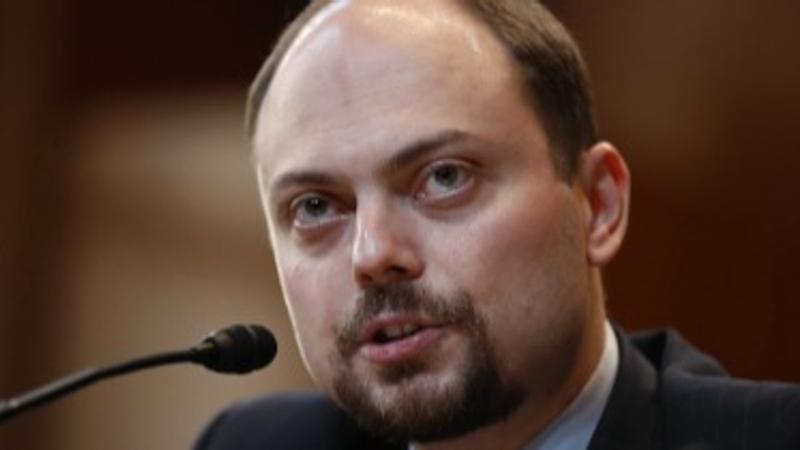Published 00:16 IST, July 6th 2024
Kremlin Critic Kara-Murza Transferred to Prison Hospital
The development comes as the Kremlin continues its unrelenting crackdown on dissent that has ensnared thousands of people — prominent opposition activists and o

Estonia: Imprisoned Russian opposition politician Vladimir Kara-Murza has been transferred to a prison hospital, and his attorneys have been unable to visit him there since Thursday, his wife and one of his lawyers said Friday.
The development comes as the Kremlin continues its unrelenting crackdown on dissent that has ensnared thousands of people — prominent opposition activists and ordinary Russians alike — since the start of the war in Ukraine in February 2022.
Kara-Murza, 42, was convicted of treason last year over a number of public speeches harshly critical of the Kremlin. He has rejected the charges against him as punishment for standing up to Russian President Vladimir Putin and likened the proceedings to the show trials under Soviet dictator Josef Stalin. He is serving 25 years, the stiffest sentence for a Kremlin critic in modern Russia, in a penal colony in the Siberian city of Omsk.
Kara-Murza's lawyers went to Penal Colony No. 6 on Thursday to visit him, but after hours of waiting were turned away by prison officials who said he had been transferred to a prison hospital, Yevgenia Kara-Murza and lawyer Vadim Prokhorov said in an online statement Friday. They said the lawyers were also not able to see him in the hospital on Thursday or Friday — hospital staff kept turning them away citing various administrative reasons.
“The lawyers were unable to see Vladimir and make sure he's doing well ahead of the weekend,” when visiting is not allowed, Kara-Murza and Prokhorov said.
Kara-Murza's wife and lawyers have regularly sounded the alarm about his deteriorating health. It has apparently worsened behind bars, especially as Kara-Murza has spent months solitary confinement — a practice that has become common for Kremlin critics and is widely viewed as designed to put additional pressure on them.
In 2015 and 2017, Kara-Murza suffered two near-fatal poisonings in 2015 and 2017 and developed polyneuropathy, a condition that deadens the feeling in his limbs. While he received some treatment in pretrial detention in Moscow, there has been none at the penal colony in Omsk, his wife Yevgenia told The Associated Press in an interview earlier this year.
Earlier this year, Kara-Murza, who rose to prominence as a journalist and has written columns as a contributor for The Washington Post from his prison cell, won the Pulitzer Prize for commentary. He has been declared a political prisoner by Russia's prominent human rights group Memorial, and officials in the West have repeatedly called for his release.
Moves to neutralize opposition and stifle criticism intensified significantly after the start of the war, including passage of a law effectively criminalizing any public expression about the conflict that deviates from the Kremlin line. The legislation that outlaws “spreading false information” about the Russian army or “discrediting it” has been used against opposition politicians, human rights activists and ordinary Russians critical of the Kremlin, with many receiving long prison terms.
According to OVD-Info, a prominent rights group that monitors political arrests and provides legal aid, a total of 20,040 Russians were arrested between Feb. 24, 2022, when the war began, and May 20, 2024, for speaking out or demonstrating against the invasion.
A total of 983 people have faced criminal charges for their antiwar stances, and nearly 9,500 faced petty charges of discrediting the army, punishable by a fine or a short stint in jail, OVD-Info reported.
In one of the latest developments in the crackdown, the prosecution has called for a six-year sentence for a Russian theater director and a playwright who are accused of advocating terrorism in a play and have been behind bars for more than a year, their lawyers said Friday.
The lawyers said in a Telegram post that the sentence demand was made Thursday in the trial of Zhenya Berkovich and Svetlana Petriychuk, which comes during a crackdown on dissent in Russia that has reached new heights since Moscow sent troops into Ukraine.
Director Berkovich and playwright Petriychuk face the charges for the play “Finist, the Brave Falcon,” about a Russian woman who becomes enamored online, goes to Syria and then faces trial on terrorism charges upon returning to Russia.
Authorities say the play attempts to justify terrorism, but Berkovich has testified in court that she staged the play in order to prevent terrorism.
The women's lawyers have noted at court hearings that the play was supported by the Russian Culture Ministry and won the Golden Mask award, Russia's most prestigious national theater award. In 2019, the play was read to inmates of a women's prison in Siberia, and Russia's state penitentiary service praised it on its website, Petriychuk's lawyer has said.
(Except for the headline, this story has not been edited by Republic and is published from a syndicated feed.)
Updated 00:16 IST, July 6th 2024




